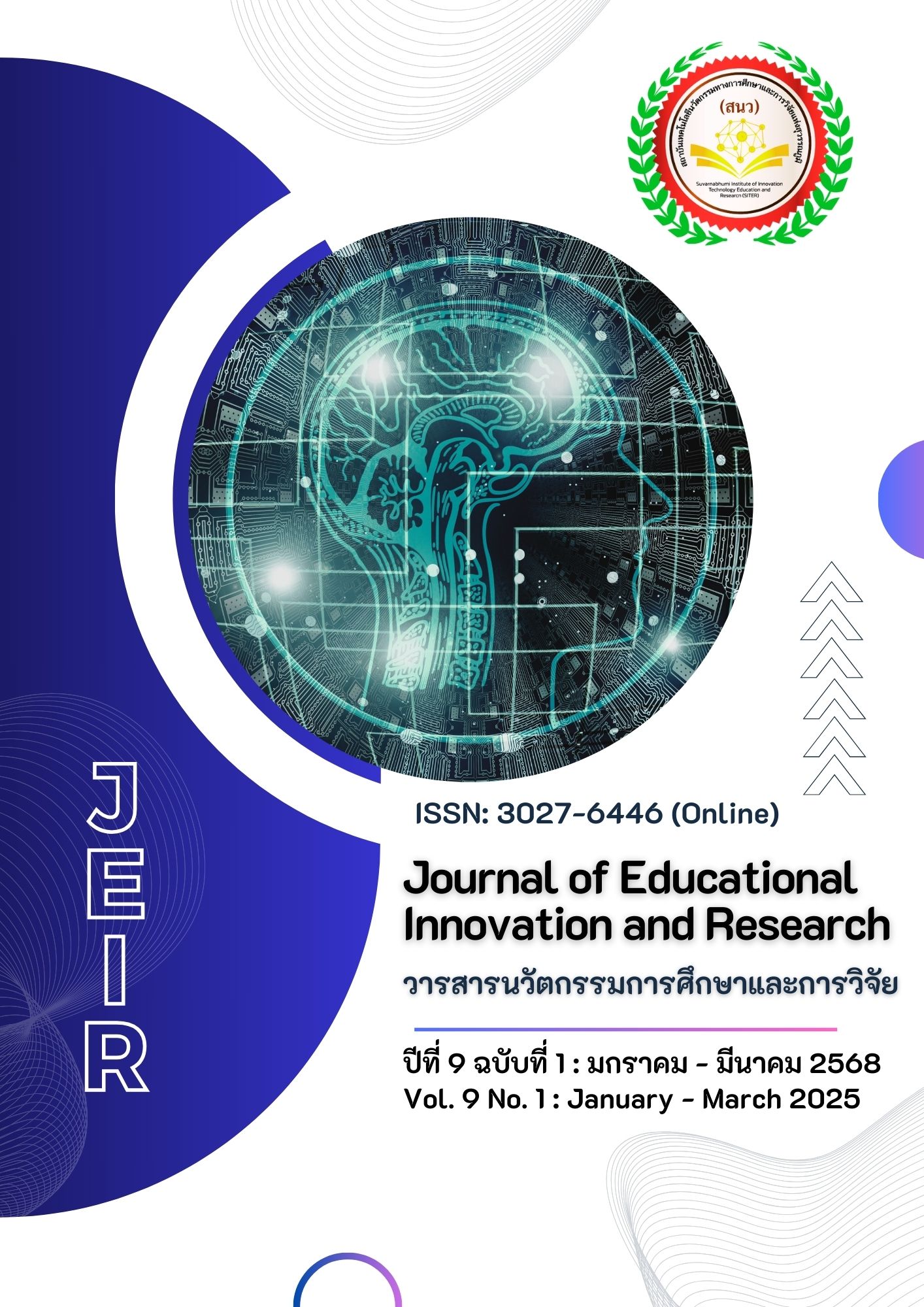การพัฒนาโปรแกรมการพัฒนาวิชาชีพครู ในการจัดการเรียนรู้วิทยาศาสตร์ ฐานสมรรถนะตามแนวสืบเสาะ
Main Article Content
บทคัดย่อ
งานวิจัยนี้มีวัตถุประสงค์ดังนี้ 1) เพื่อพัฒนาความสามารถของครูวิทยาศาสตร์ประจำการในการจัดการเรียนรู้สมรรถนะทางวิทยาศาสตร์ตามแนวสืบเสาะ 2) เพื่อพัฒนาโปรแกรมการพัฒนาวิชาชีพครูเพื่อจัดการเรียนรู้สมรรถนะทางวิทยาศาสตร์ตามแนวสืบเสาะ รูปแบบการวิจัยเป็นแบบผสมผสานใช้แนวคิดในการจัดการเรียนรู้แบบสืบเสาะเป็นกรอบการวิจัย กลุ่มที่ศึกษาคือครูผู้สอนวิทยาศาสตร์จำนวน 18 คน เครื่องมือที่ใช้ในงานวิจัยได้แก่ 1) แบบประเมินกิจกรรมการเรียนรู้ 2) แบบบันทึกการสังเกตการสอน 3) แบบบันทึกภาคสนาม ผู้วิจัยวิเคราะห์ข้อมูลโดยใช้สถิติเชิงบรรยายและการวิเคราะห์เชิงเนื้อหา ผลการวิจัยมีดังนี้ 1) หลังการเข้าร่วมโปรแกรมการพัฒนาวิชาชีพครู พบว่าครูมีความสามารถในการจัดการเรียนรู้วิทยาศาสตร์ฐานสมรรถนะตามแนวสืบเสาะ แต่มีข้อจำกัดในการจัดการเรียนรู้ตามแนวสืบเสาะที่มุ่งเน้นการส่งเสริมทักษะการคิดขั้นสูงให้แก่ผู้เรียน 2) แนวทางการพัฒนาโปรแกรมการพัฒนาครูในการจัดการเรียนรู้สมรรถนะทางวิทยาศาสตร์ตามแนวสืบเสาะ ประกอบไปด้วย (1) การพัฒนาวิชาชีพออนไลน์ (2) การโค้ชจากผู้เชี่ยวชาญ (3) การสร้างเครือข่ายการเรียนรู้ (4) การเสริมสร้าง ความรู้ ทักษะ เจตคติและสมรรถนะ (5) การสะท้อนการปฏิบัติการสอน (6) การเรียนรู้ผ่านประสบการณ์แบบสืบเสาะ (7) ใช้กลยุทธ์ที่หลากหลาย ข้อค้นพบจากงานวิจัยนี้เป็นประโยชน์ให้กับสถาบันการผลิตและพัฒนาครูที่จะนำแนวทางดังกล่าวไปใช้พัฒนาครูวิทยาศาสตร์ต่อไปในอนาคต
Article Details

อนุญาตภายใต้เงื่อนไข Creative Commons Attribution-NonCommercial-NoDerivatives 4.0 International License.
เอกสารอ้างอิง
Ahmad Zaky El Islami, R., Anantanukulwong, R., & Faikhamta, C. (2022). Trends of Teacher Professional Development Strategies: A Systematic Review. Shanlax International Journal of Education, 10(2), 1-8.
Borko, H., Jacobs, J., & Koellner, K. (2010). Contemporary approaches to teacher professional development. International encyclopedia of education, 7(2), 548-556.
Bybee, R. W. (2013). The case for STEM education: Challenges and opportunities. NSTA Press.
Desimone, L. M. (2009). Improving impact studies of teachers’ professional development: Toward better conceptualizations and measures. Educational researcher, 38(3), 181-199.
Desimone, L. M., & Garet, M. S. (2015). Best practices in teacher's professional development in the United States. Psychology, Society & Education, 7(3), 252-263.
Dokmai, P., Supprakob, S., Potisart, J., & Prachopchok, P. (2023). The development of an online professional development program to enhance STEM education teaching competencies of first-year science student teachers. STOU Education Journal, 16(1), 176-194.
Faikhamta, C., Prasoplarb, T., Praisri, A., Pongsanon, K., Phurat, N., & Sa-ard, K. (2023). Development of professional learning community to foster in-service science teachers’pedagogical content knowledge for teaching higher-order thinking (PCK for teaching HOTs). Journal of Science and Science Education (JSSE), 6(1), 63-73.
Khumraksa, B. (2021). The use of research-based learning to promote active learning in science education. CMU Journal of Education, 5(1), 58-74.
Ladachart, L., & Ladachart, L. (2019). Teaching and learning that emphasizes scientific competencies. Journal of Education Khon Kaen University, 42(4), 1-19.
Loucks-Horsley, S., Stiles, K. E., Mundry, S., Love, N., & Hewson, P. W. (2010). Designing professional development for teachers of science and mathematics (3rd ed.). Corwin Press.
National Research Council. (2000). Inquiry and the national science education standards: A guide for teaching and learning. National Academies Press.
Neangjakoun, P., Kittiauchawal, K., Khwantrairong, T., Lijuan, W., & Nueangaudom, A. (2024). Approaches for the development of competency-based through active learning in science: Current practice, problems and needs of science teachers. Journal of Yala Rajabhat University, 19(1), 59-67.
Osborne, J. F., Borko, H., Fishman, E., Gomez Zaccarelli, F., Berson, E., Busch, K. C., ... & Tseng, A. (2019). Impacts of a practice-based professional development program on elementary teachers’ facilitation of and student engagement with scientific argumentation. American educational research journal, 56(4), 1067-1112.
Syukri, M., Yulisman, H., & Nurina, C. I. E. (2020). A systematic literature review of science teachers’ TPACK related to STEM in developing a TPACK-STEM scale. Journal of Physics: Conference Series, 1460. https://doi.org/10.1088/1742-6596/1460/1/012105
Thammaprateep, J. (2023). Development of Learning Design for Competency-Based Learning of Science Teachers by Using Self-Directed Learning Strategies. STOU Education Journal, 16(2),123-140.
The Institute for the Promotion of Teaching Science and Technology. (2024, January 20). Evaluation Framework of Science Competencies. https://pisathailand.ipst.ac.th/about-pisa/science_competency _framewark/
The Organization for Economic Co-operation and Development. (2024, January 20). PISA for development assessment and analytical framework: Reading, Mathematics and Science. http://dx.doi.org/10.1787/9789264305274-en
The Organization for Economic Cooperation and Development. (2024, March 31). PISA 2025 science framework. https://pisa-framework.oecd.org/science-2025/
Tonga, F. E., Eryiğit, S., Yalçın, F. A., & Erden, F. T. (2022). Professional development of teachers in PISA achiever countries: Finland, Estonia, Japan, Singapore and China. Professional development in education, 48(1), 88-104.
Unha, R., & Somnuk, S. (2023). Effect of 5 STEPs learning process on learning achievement and scientific creativity of Prathomsuksa 5 students under the Ayutthaya Primary Educational Service Area Office. Journal of Educational Innovation and Research, 7(4), 1270-1285.
Wetwiriyasakun, P. (2022). The professional learning community network model for enhancing science learning management competence and teamwork of teachers in educational institutions of Songkhla. Journal of Buddhist Anthropology, 7(5), 278–294.


